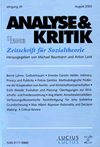Suchergebnisse
"Thomas Schramme"
Titel: On the Relationship between Political Philosophy and Empirical Sciences
Autor: Thomas Schramme
Seite: 613-626
Abstract: In this paper, I will focus on the role that findings of the empirical sciences might play in justifying normative claims in political philosophy. In the first section, I will describe how political theory has become a discipline divorced from empirical sciences, against a strong current in post-war political philosophy. I then argue that Rawls’s idea of reflective equilibrium, rightly interpreted, leads to a perspective on the matter of justification that takes seriously empirical findings regarding currently held normative beliefs of people. I will finally outline some functions that empirical studies might have in political philosophy.
Titel: Is Rawlsian Justice Bad for the Environment?
Autor: Thomas Schramme
Seite: 146-157
There is enough in the world for everybody’s
need, but not enough for anybody’s greed.
Mahatma Ghandi
Abstract: In this paper I show that Rawls’s contract apparatus in A Theory of Justice depends on a particular presumption that is in conflict with the goal of conserving environmental resources. He presumes that parties in the original position want as many resources as possible. I challenge Rawls’s approach by introducing a rational alternative to maximising. The strategy of satisficing merely goes for what is good enough. However, it seems that under conditions of scarcity Rawls’s maximising strategy is the only rational alternative. I therefore scrutinise the common account of scarcity. I distinguish between absolute and relative scarcity in order to show that scarcity is influenced by our decisions. If we would not accept the claim to as much as possible without further legitimisation, like Rawls does, then scarcity might not be as severe a problem. Finally, I reject Rawls’s proposed solution for dealing with problems of sustainability, namely his idea of the just savings principle. I conclude that Rawlsian Justice as Fairness is bad for the environment.
Titel: Natürlichkeit als Wert
Autor: Thomas Schramme
Seite: 249-271
Abstract: The predicate 'natural' is often used in a normative fashion, especially in Bioethics. But that something is natural does not alone suffice to explain its value. In this essay, I want to fulfil mainly two tasks: Firstly, to differentiate between several usages of the concept of naturalness and scrutinize whether they may serve a function in ethics; secondly, to argue for the (eudaimonistic, not moral) value of naturalness in certain respects. The value of the natural lies firstly in its significance for human well-being: specific natural functions form necessary elements and conditions of the ability to lead a good life. Secondly, the very feature of the natural, its being purposeless, which implies that we cannot read our aims out of nature, serves as the basis of its eudaimonistic value.
Titel: Verteilungsgerechtigkeit ohne Verteilungsgleichheit
Autor: Thomas Schramme
Seite: 171-191
Abstract: Alternative approaches in the discussion of distributive justice differ in their answers to the question 'equality of what'? In this essay I intend to ask instead 'why equality'? The article rejects several arguments in favour of distributive equality, mainly on the grounds that they confuse two different kinds of justice, namely 'formal' justice (equal respect) and distributive justice. The ideal of distributive equality is based on comparisons but equal respect does not necessarily involve relational considerations. Subsequently I will consider equality of opportunity which appears on first sight to be the most promising account. However, I will point out that this approach is not convincing as an attempt to give everyone the chance to live a good life. Finally I will submit that only a theory of absolute needs is adequate.

Ecological Goals and Liberal Ideals: Harmony or Conflict?
2006 (28) Heft 2
Guest-Editor: Thomas Schramme
Editorial
Liberty, equality, justice and solidarity are traditional political ideals of modern Western democracies. Different traditions and parties have supported different models in order to harmonise them. In contrast to the prevalence and long history of these values, ecological goals and needs have moved onto the political agenda fairly recently. Hence it should not come as a surprise that there is no consensus about the compatibility of ecological ambitions with common Western political ideals. Righ...